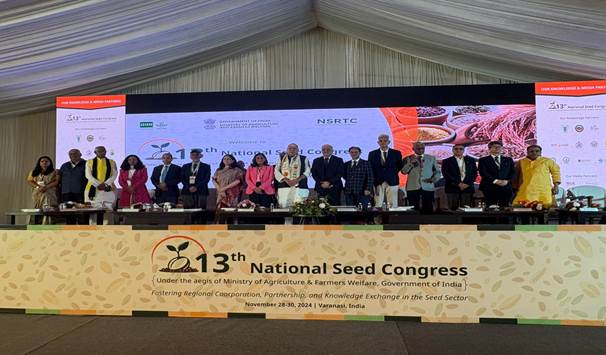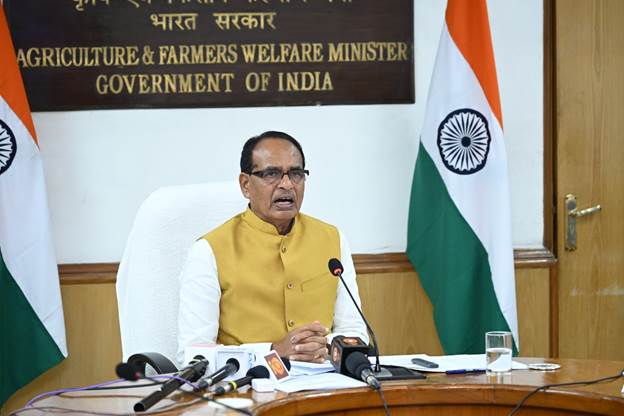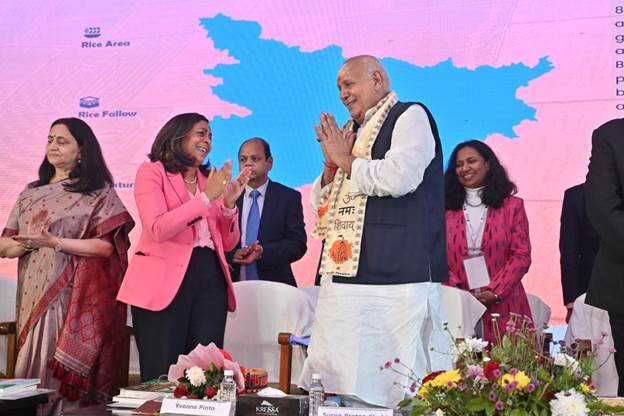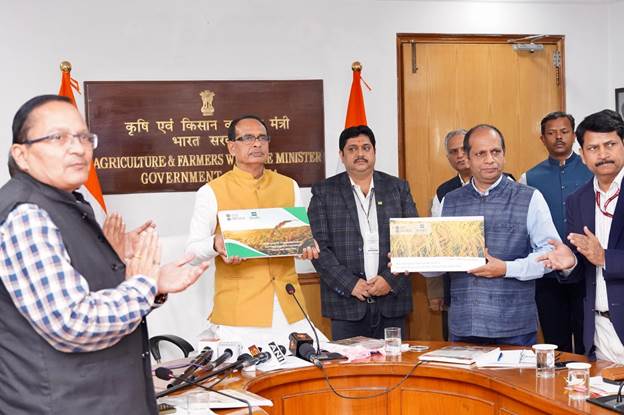Union Minister of Agriculture & Farmers’ Welfare inaugurates 13th National Seed Congress in Varanasi
Union Minister of Agriculture & Farmers’ Welfare inaugurates 13th National Seed Congress in Varanasi
The 13th National Seed Congress (NSC) 2024, a premier event organized by the Ministry of Agriculture & Farmers’ Welfare, Government of India, was inaugurated today by Union Minister of Agriculture and Farmers Welfare Shri Shivraj Singh Chouhan, who addressed the gathering virtually. The three-day Congress, to be held from 28 to 30 November 2024, at the International Rice Research Institute South Asia Regional Centre (ISARC) in Varanasi, has brought together over 700 delegates, including experts, policymakers, industry leaders, research scholars, and farmers, to deliberate on key issues and advancements in the seed sector.

The inaugural ceremony was graced by the presence of Shri Surya Pratap Shahi, Hon’ble Agriculture Minister of Uttar Pradesh; Dr. Devesh Chaturvedi, Secretary, Agriculture, Government of Uttar Pradesh; Dr. Yvonne Pinto, Director General, IRRI; Smt. Shubha Thakur, Additional Secretary, Ministry of Agriculture & Farmers’ Welfare, Government of India; Dr. Ajay Kohli, Deputy Director General (Research), IRRI; Dr. Sudhanshu Singh, Director, ISARC; and other distinguished dignitaries from the public and private seed sectors.
Union Minister of Agriculture and Farmers’ Welfare Shri Shivraj Singh Chouhan in his address, highlighted India’s growing leadership in the global seed sector. He emphasized the importance of leveraging India’s biodiversity, research capacity, and innovative technologies to meet the challenges posed by climate change and food security.
“The National Seed Congress provides a vital platform for exchanging knowledge, fostering partnerships, and driving innovation to strengthen seed systems. This Congress reflects India’s commitment to ensuring food security, addressing climate challenges, and empowering smallholder farmers with access to quality seeds. I encourage the experts and participants to develop actionable strategies to make seeds more accessible, affordable, and impactful through strengthened public-private partnerships,” he stated.

Shri Surya Pratap Shahi, Agriculture Minister of Uttar Pradesh, expressed pride in hosting this landmark event, emphasizing the state’s agricultural contributions and future goals. “Uttar Pradesh has a rich tradition of advancing agriculture and is honored to host this Congress in Varanasi. This event allows us to align with cutting-edge innovations and promote sustainable practices that reach every farmer. Initiatives like ISARC and the upcoming International Potato Centre will further strengthen seed systems in the state and South Asia. Our plans for 200 seed parks, alongside increased oilseed and millet cultivation, will bolster Uttar Pradesh’s agricultural leadership,” he added.

Shri Devesh Chaturvedi, Secretary, DA&FW, in the inaugural session of NSC 2024 emphasized prioritizing the seed sector to make Indian agriculture more competitive. Post-Green Revolution, India achieved self-sufficiency in key crops. Guided by Hon’ble PM’s vision, India aims to become the Food Basket of the World, he said. “The SATHI portal will enhance seed quality traceability, boosting farmer trust through improved certification systems. Focus areas include seed innovation, biofortification, high-speed breeding, and sustainable productivity to feed both India and the globe.” he further added.
Dr. Yvonne Pinto, Director General, IRRI, emphasized the importance of collaboration: “This Congress is a vital platform to foster collaboration, innovation, and shared solutions in the seed sector. The theme, ‘Fostering Regional Cooperation, Partnerships, and Knowledge in the Seed Sector,’ could not be more relevant as we face global challenges such as climate change, food insecurity, and the need for sustainable agriculture. Regional collaboration and partnerships play a pivotal role in strengthening seed systems, increasing productivity, and promoting practices that are both equitable and resilient.”
During the event, the Abstract Compendium and the Rice Fallow Webpage & Atlas for the states of Bihar, Chhattisgarh, Jharkhand, and West Bengal were formally launched.
The Rice Fallow Webpage & Atlas is a groundbreaking initiative leveraging geospatial technology to map and analyze fallow lands in Eastern India. Developed in collaboration with researchers and policymakers, this tool provides actionable insights to optimize crop planning, enhance system intensification, and improve food security in the region.

The inaugural day featured three impactful plenary sessions:
A significant side event, “Targeting Rice Fallows and System Intensification through Geo-Spatial Technology of Eastern India,” chaired by Smt. Shubha Thakur, Additional Secretary (Crops), Ministry of Agriculture & Farmers Welfare, Govt. of India, discussed innovative approaches to agricultural transformation in Eastern India.
Additionally, the technical session “Emerging Seed Technologies, Quality Assurance, and Regulatory Standards” brought together experts to address advancements and regulatory frameworks shaping the seed industry.
The inaugural day of the 13th National Seed Congress 2024 set a dynamic foundation for meaningful collaborations and innovative policies. With robust discussions and new ideas, the Congress aims to strengthen India’s leadership in the global seed sector and pave the way for sustainable agricultural practices.
The Congress will continue to explore critical themes over the next two days, providing actionable insights and shaping the future of seed systems in India and beyond.
- “India’s Role in the Global Seed Sector: Opportunities and Expectations”
This session explored India’s leadership in the global seed market, highlighting opportunities for growth through public-private collaborations. Speakers included Dr. Hans Bhardwaj (IRRI), Mr. Ajai Rana (FSII), and Mr. Mohan Babu (Corteva Agriscience).
- “Fostering South-South Collaboration in the Seed Sector”
This session focused on partnerships among Global South nations to address shared challenges and foster innovation. Speakers such as Dr. Rabe Yahaya (ISARC), Dr. Pratibha Singh, and Dr. Ganga Acharya discussed strategies for building capacity and ensuring food security.
- “Strengthening the Seed Sector through Public-Private Partnerships”
This session emphasized the critical role of collaboration between government bodies and private enterprises to improve seed quality and accessibility. Speakers highlighted successful examples and explored strategies for policy alignment.